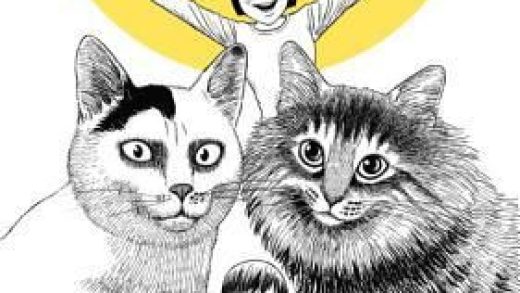In her debut novel, Braised Pork, An Yu explores a widow’s journey to self-realization and the mysteries of the people we think we know best. The story begins when a woman finds her husband crouched awkwardly in a bathtub, dead of indeterminate cause. On a stack of towels, she finds a piece of paper with a crude drawing of a fish’s body with a man’s head attached. Jia Jia can’t fathom what it means. She had been married to Chen Hang for years, but they never really knew one another. Theirs had been a marriage of intention, not love. What could the fish-man mean?
So begins a quest. Spurred by vivid dreams of a world of water, it takes Jia Jia on a journey both emotional and physical. For years, she had submerged herself as a woman and as an artist in domesticity, and now, without Chen Hang to anchor her, she was free to inhabit a larger world of her own making. She begins painting again. She tries on a love affair with Leo, a tender-mannered bartender. She reaches out to her father to try to reconcile with the grief of losing her mother. Finally, she leaves Beijing and travels to Tibet, following in the exact footsteps of her dead husband to seek answers to his death. Along the way, she meets people who have found, or who are also searching for, their own world of water.
At heart, this novel is about our universal need for human connection, and how fraught that desire can be, since we can never really know the heart of another. The characters seem sometimes to be motivated by contrasting impulses, and the sense of alienation from each other, from their surroundings, is palpable. We don’t always know ourselves, or others—even those we’ve known all our lives. How can we when, as Ja Jia says in the book, “we explain things we don’t understand by using other things we don’t understand”? It’s a sense that’s heightened by the blurred lines between the real and the mythical in this book.
In the end, a quest may prove elusive. It may or may not yield the sort of resolution one hopes for. But sometimes, perhaps the resolution itself is less important than the willingness to let go of the need for one.
Emily Ding: Your novel is braided together by incredibly strong images and motifs, like the fish-man. What was the spark for your story?
An Yu: It began with a very vague plot that involved a woman going through trauma with a failed marriage and going on a journey in search of herself and her past. I started experimenting with different stories and characters in the short-story format at first. Then, I had a dream about a fish-man, which is very similar to the dream that Jia Jia’s husband had.
ED: What struck me reading your book was the essential unknowability of people, even if we spend every day with them. Was this something you were trying to explore in your book?
AY: It’s definitely a running theme. I think it’s exactly like you said. Oftentimes we can spend our whole lives with someone, and we can think that we know certain people who are the closest to us. And yet, there is always a disconnect, especially in times of trauma. Those are the times when you find out it’s impossible to completely empathize 100% with another person.
There’s the relationship between Jia Jia and her husband, Chen Hang. Later on, there’s the relationship between her and Leo, who she feels far more emotionally connected to. And yet, there are still moments when she finds that all the pain she is going through, she has to go through alone. Leo won’t be able to understand her fully.
ED: What reinforces this sense of indefinability for me, in part, is the seamlessness between the cold, concrete, everyday reality of Beijing, and the underlying mythical world that the characters slip into. How do you see your characters, Jia Jia especially, navigating both these worlds?
AY: I was born and raised in Beijing and left for New York at the age of 18 and didn’t move back until recently. So I’ve been away for the past ten years or so. On the more surface level, every time I’ve been back I’ve seen the city change, like a monster constantly evolving by nature, morphing into something else. And there is something unsettling about that. Often, I had this feeling in tiny tiny moments that would last just a split second—like I was being thrown into something that was like a dream, or a parallel sense of reality.
In the context of urban Beijing, oftentimes you do need a sense of the surreal to make sense of the real. I think charging headlong into reality and trying to look for answers there doesn’t always work. There are certain answers you’ll neer be able to find. And these might not be concrete answers; the answers might be questions that are answers to your questions.
I think there are many characters in this novel who are, in some way or another, searching for the world of water. Or rather, they have different experiences of it—whether it’s been foisted upon them; or whether they go out of their way to search for it, even if it might be fruitless. I never intended the world of water to symbolise or mean one thing to all the characters, though there may be overlaps.
ED: In your novel, people seem stilted in their interactions with each other, finding it hard to make a connection. And with Jia Jia, I got the feeling in the beginning that, though sometimes it seems the domestic part of her was the real Jia Jia, the flashes of boldness she exhibited in Leo’s bar that felt like acting came across sometimes like the real her. What drives this alienation, this dislocation, in your book?
AY: Well, there is this preoccupation with the self, so much that it’s impossible to even try to understand another person. Then there’s the alienation of living in a city where you don’t have much time to even think about others.
It’s not necessarily true that the people you’re closest to are the people you can connect to the most.
That feeling is also often, in the context of this book, how people feel like when they can’t really connect or fully heal another person’s wounds or completely be there for another person. You realise there is nothing you can do to help them feel differently. There is a sense of helplessness.
So it’s this feeling of being alienated from the people closest to you and finding connection with people who might be strangers. I think that is something I’m trying to explore not just in this novel, but also in my other writing. It’s not necessarily true that the people you’re closest to are the people you can connect to the most. There might be very small moments with strangers that could have much more emotional impact.
ED: You talked about wanting to explore the idea of a woman going through the trauma of a failed marriage searching for herself. And many of the women in your novel end up in failed marriages, for different reasons. But they all yearn for a larger existence, where they are more central to their own lives and stories. What underlined your explorations of love and marriage in this book?
AY: I suppose I’m not trying to say anything about marriage per se, but more this feeling of never being able to correctly know what marriage should be, what love should be, in the context of human nature and the evolution of society towards a more globalised, modern, American-influenced one. And, at the same time, how we try to hold on to the cultures and traditions of the past, and navigate between the two; and trying to decide for yourself what would be best for you going forward, but never really being able to know. Also, having to constantly recast your life plan as well as your beliefs according to what’s happening to you and work on your own emotional response to it.
ED: What you just said makes me think of one line in the book that kind of stood out to me. I think Jia Jia and Leo are talking, and he says, “Don’t you think that sometimes we just need to love in the simplest way possible?”
AY: I think for Jia Jia, she has been struggling with the concept of marriage and love ever since she was a child because of her parents’ marriage, and she was set on marrying for reasons more rational than love. She married the man that she didn’t quite understand, and after he dies, she begins to get a more distant view and see who Chen Hang was in real life: that he was, in fact, a simple man and she could see all his faults more clearly.
Leo, he’s a bartender who watches people every day and he’s met a lot of people. And after all that, he’s looking to go back to what is the most simple. He doesn’t have or want a very complicated life, or an ambitious life. He sees a relationship as something stripped down to the core of love. You love someone, you want to be with them.
For Jia Jia, she’s had years of turmoil, of not being able to understand her parents and her own marriage. She still has to go on this emotional and physical journey by herself. Towards the end of the novel, she perhaps feels like there is a change in her view towards what simplicity is and what marriage is. But again, that answer lies in all the new questions that she has.
ED: Despite Jia Jia having seen Chen Hang more clearly, and seen the faults of their marriage, after his death, she continues to hang on to Chen Hang’s memory and follows exactly his itinerary when he had gone on a pilgrimage once to Tibet. What compells her?
AY: I think that doesn’t apply just to Jia Jia and her husband but also Jia Jia and her mother and her father, where she’s consistently being torn between pain and love and a sense of attachment, and how these people have made her the person she is and how she can never fully reject them. They are the people who are closest to her.
So even though she wasn’t in a loving relationship with Chen Hang, it was nonetheless a legitimate relationship. And, you know, she spent every day with him, she gave her life to him. It’s not so easy for him to just walk out of her life psychologically. Essentially, that’s what kicks off her journey to look for the fish-man. To her, it was the only choice going forward, to find answers. But the answers she find are certainly unique to her and not the answers her husband was looking for.
It’s impossible for Jia Jia to remove herself from the pain of the past. It’s impossible for her to look for hope without looking into that pain.
The post A Cross-Country Trip to Chase a Merman appeared first on Electric Literature.











